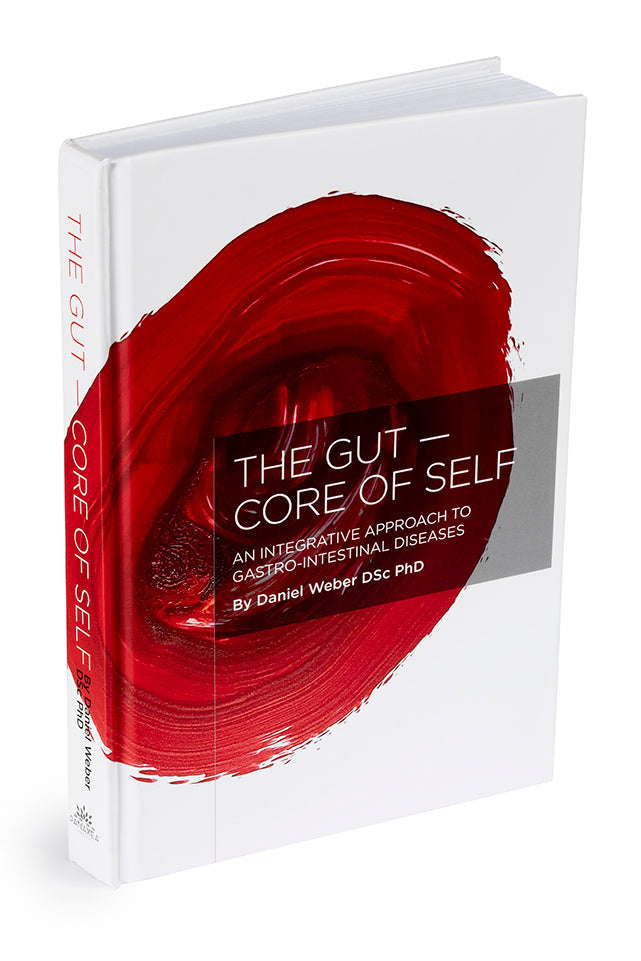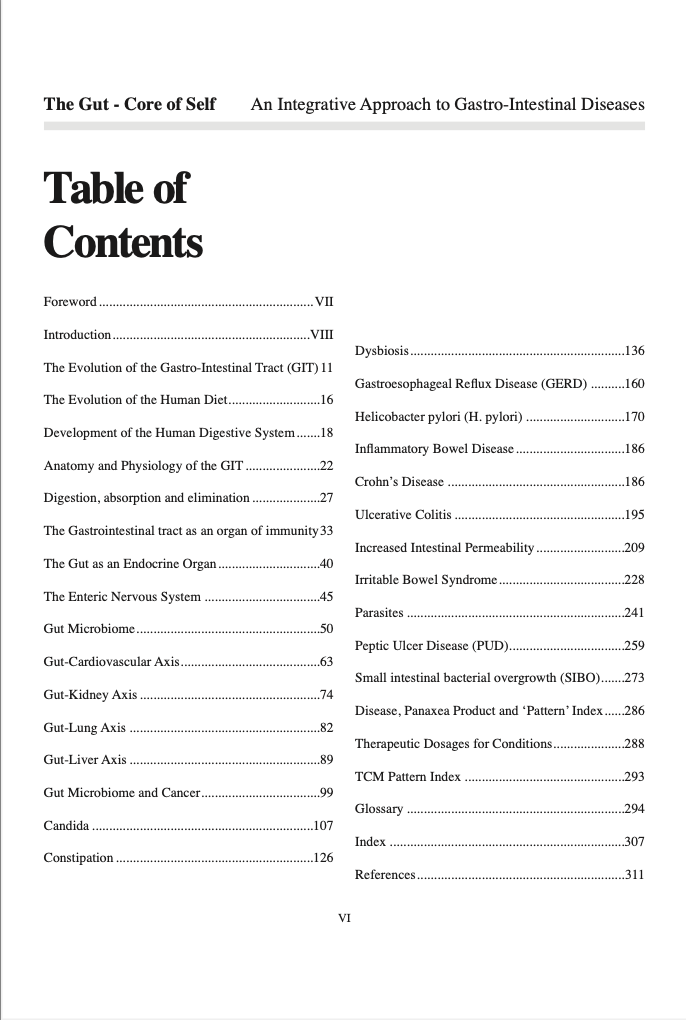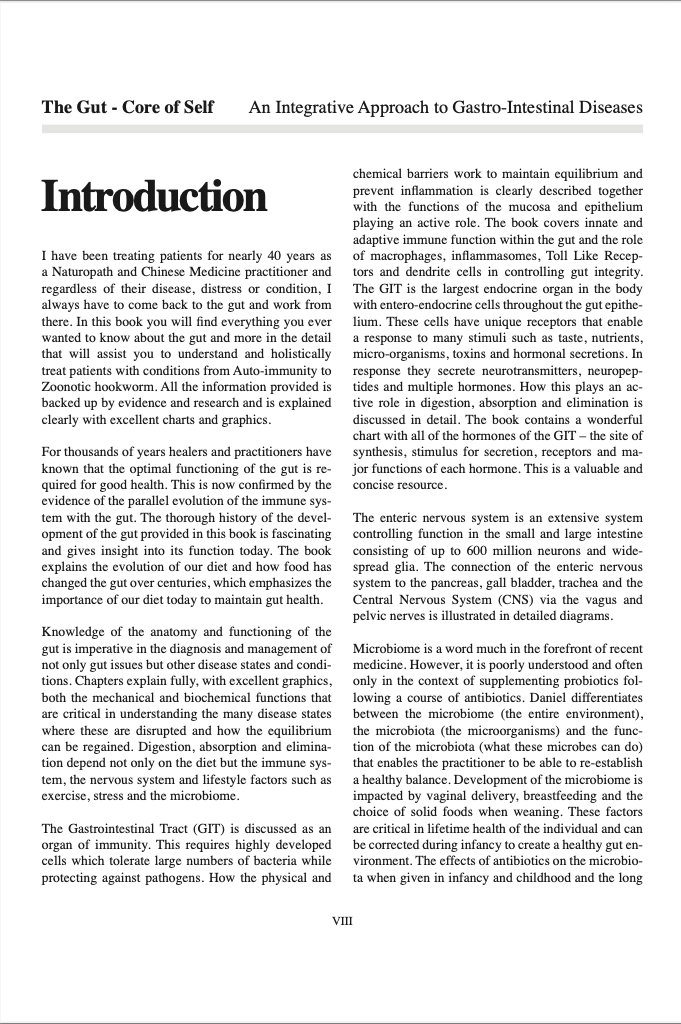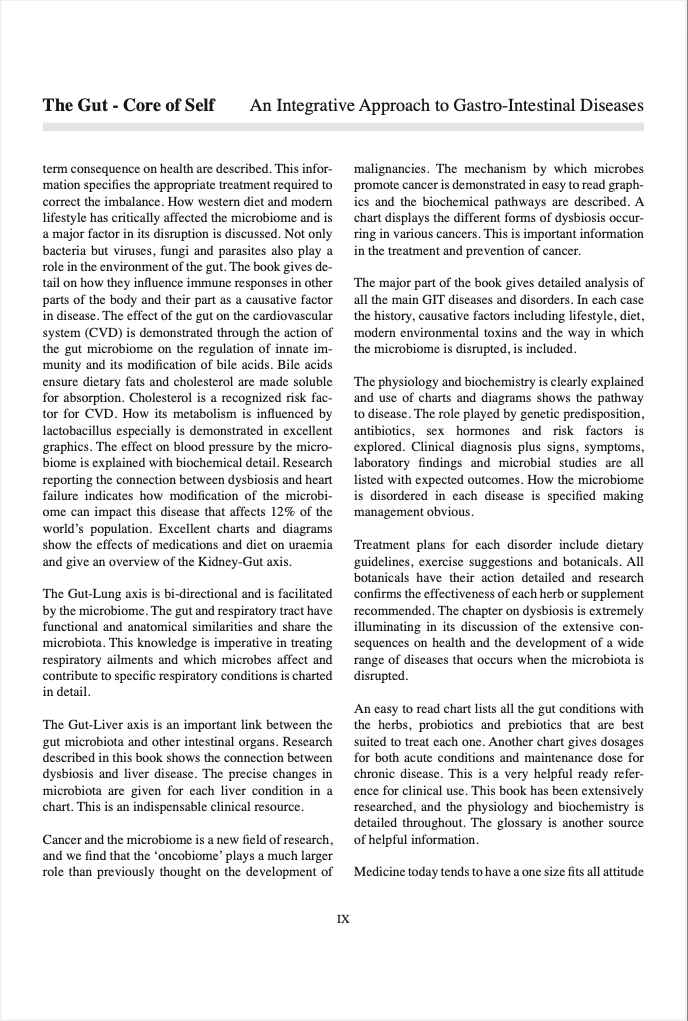



The Gut - Core of Self
Foreword
This book attempts to integrate two differing ap- proaches to medicine: Rationalism and Holism. While admirably desirable, it is yet near impossible to inte- grate these two systems into a coherent whole. Ratio- nalism, the basis of modern science, leads to reduc- tionism and then on to a conclusive point. Something is proven true or not. Holism is based on the personal engagement, a more subject and relational understand- ing. Something may be both true and not true, simul- taneal. [See Uncertainty Principle] Something that is true must engage our humanity and our suffering. It is complex.
Rene Descartes stated that humans are subjective observers of objective events, thereby opening thinking that led to the separation of ‘mind’ and body, of self from life. In pure science such as mathematics or astronomy, Rationalism is, perhaps the only scientific approach. Medicine is, however, an experiential science and more aligned with subjective factors. It is in many ways; it is having metaphorical underpinnings. Contemporary Biomedical science, has, without doubt contributed to the well-being of humanity, as well as a number of other species. Its cost is the loss of the experience of embodiment. It reduces life to a series of accidental mutations, which randomly occur. Life has no purpose or significance. [See Jacques Derrida, Michel Foucault]. Holism is based upon the philosophy of empiricism. [Empiricism is a theory that states that knowledge comes only or primarily from sensory experience, unlike Rationalism, which remove the ‘human’ from the equation].
Holism sees disease within the context of the patient’s life. Not just life-style factors per se but also the patient’s relationships, both intimate and social. The patient’s socio-economic status, the patient’s family history, possible early childhood trauma as well as genetic and epigenetic factors. Theoretically, a Holistic practitioner ‘sees/intuits’ factors beyond cause and effect. Intuition is missing in Rationalism, which deprive a good practitioner with some decades of practice, a more complex treatment process. Holism gains traction in its willingness to engage the unknown. The Western Biomedical approach leads to both the specialisation of its practice but also to the commodification of medicine. Western biomedicine is a product to be marketed and sold. It pontificates on its efficacy and accomplishments yet in practice it only works within the context of access (money/power/ society) and mostly focuses on pathology, not the factors that give rise to that suffering. Humans are complex, experiential bodies that suffer, not diseased molecules. This is not argument against Biomedical science but a recognition that medicine is a living, human discipline, that needs both parents: Rationalism and Empiricism.
We need a philosophy of medicine, more than the thin Cartesian separation of self from its rich and unique experiences. The Stanford Encyclopedia of Philosophy Archive in its June six, 2016 publication, ‘Philosophy of Medicine’ states that philosophy and medicine, both beginning with the ancient Greeks, have had a long history of overlapping ideas. It was not until the nineteenth century that the professionalisation of the philosophy of medicine came to be. Arthur Caplan stated in 1992, that “In the late twentieth century debates among philosophers and physicians ensued of whether or not the philosophy of medicine should be considered a field of its own from either philosophy or medicine”. Durham University’s paper ‘Science, Medicine and Society’ claims that a consensus has since been reached that it is in fact a distinct discipline with its set of separate problems and questions.
We need a new science, we need to revision medicine as service not a commodity, we need to humanise medicine while keeping a rational approach to evidence. Are we mature enough, compassionate enough to change? If so, we will all need to revision ourselves as well.
Daniel Weber DSc PhD
Foreword
This book attempts to integrate two differing ap- proaches to medicine: Rationalism and Holism. While admirably desirable, it is yet near impossible to inte- grate these two systems into a coherent whole. Ratio- nalism, the basis of modern science, leads to reduc- tionism and then on to a conclusive point. Something is proven true or not. Holism is based on the personal engagement, a more subject and relational understand- ing. Something may be both true and not true, simul- taneal. [See Uncertainty Principle] Something that is true must engage our humanity and our suffering. It is complex.
Rene Descartes stated that humans are subjective observers of objective events, thereby opening thinking that led to the separation of ‘mind’ and body, of self from life. In pure science such as mathematics or astronomy, Rationalism is, perhaps the only scientific approach. Medicine is, however, an experiential science and more aligned with subjective factors. It is in many ways; it is having metaphorical underpinnings. Contemporary Biomedical science, has, without doubt contributed to the well-being of humanity, as well as a number of other species. Its cost is the loss of the experience of embodiment. It reduces life to a series of accidental mutations, which randomly occur. Life has no purpose or significance. [See Jacques Derrida, Michel Foucault]. Holism is based upon the philosophy of empiricism. [Empiricism is a theory that states that knowledge comes only or primarily from sensory experience, unlike Rationalism, which remove the ‘human’ from the equation].
Holism sees disease within the context of the patient’s life. Not just life-style factors per se but also the patient’s relationships, both intimate and social. The patient’s socio-economic status, the patient’s family history, possible early childhood trauma as well as genetic and epigenetic factors. Theoretically, a Holistic practitioner ‘sees/intuits’ factors beyond cause and effect. Intuition is missing in Rationalism, which deprive a good practitioner with some decades of practice, a more complex treatment process. Holism gains traction in its willingness to engage the unknown. The Western Biomedical approach leads to both the specialisation of its practice but also to the commodification of medicine. Western biomedicine is a product to be marketed and sold. It pontificates on its efficacy and accomplishments yet in practice it only works within the context of access (money/power/ society) and mostly focuses on pathology, not the factors that give rise to that suffering. Humans are complex, experiential bodies that suffer, not diseased molecules. This is not argument against Biomedical science but a recognition that medicine is a living, human discipline, that needs both parents: Rationalism and Empiricism.
We need a philosophy of medicine, more than the thin Cartesian separation of self from its rich and unique experiences. The Stanford Encyclopedia of Philosophy Archive in its June six, 2016 publication, ‘Philosophy of Medicine’ states that philosophy and medicine, both beginning with the ancient Greeks, have had a long history of overlapping ideas. It was not until the nineteenth century that the professionalisation of the philosophy of medicine came to be. Arthur Caplan stated in 1992, that “In the late twentieth century debates among philosophers and physicians ensued of whether or not the philosophy of medicine should be considered a field of its own from either philosophy or medicine”. Durham University’s paper ‘Science, Medicine and Society’ claims that a consensus has since been reached that it is in fact a distinct discipline with its set of separate problems and questions.
We need a new science, we need to revision medicine as service not a commodity, we need to humanise medicine while keeping a rational approach to evidence. Are we mature enough, compassionate enough to change? If so, we will all need to revision ourselves as well.
Daniel Weber DSc PhD
